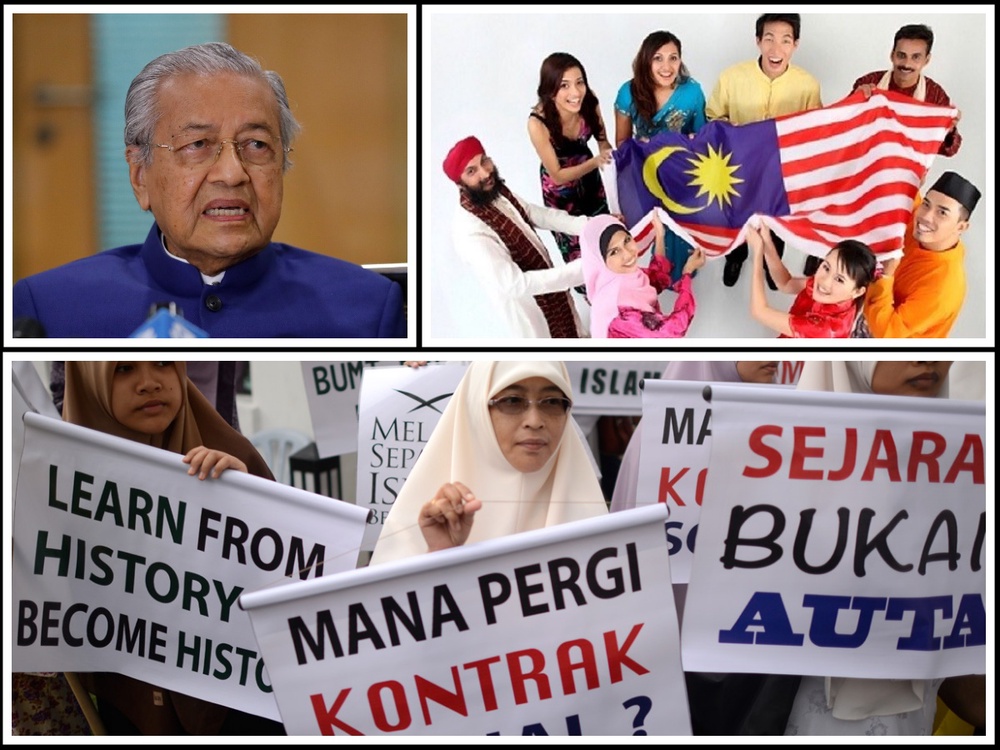Opinion: There might not be such a thing as a "Malaysian" in reality
20 Jan 2024 • 8:30 AM MYT

TheRealNehruism
Writer. Seeker. Teacher

Image credit: TheRealNehruism
Being a Malaysian is more than just a legal concept - it is also meant to be an identity.
A Malaysian, of course, exists as a legal concept – if you have a Malaysian birth certificate, IC or passport, you are Malaysian by law – but whether a Malaysian exists as an identity, is another matter altogether.
Being a Malay, Chinese or Indian, for example, is an identity, not just a legal concept. The Indians and Chinese in Malaysia, for example, are not Indians and Chinese by law. There is no law in either Malaysia, India or China that recognizes our Indian-ness or Chinese-ness, but yet we identify as Indians or Chinese. This is also true for Malays who inhabit the south of Thailand or those who have emigrated to other parts of the world.
Though there is no reason for any of us to follow the customs, celebrate the heroes, remember the history or speak the language of the identity group that no longer offers us any legal status, and although it might even be counterproductive for us to do so in our new environment, we will continue to do so anyhow, simply because we identify with these identity groups.
When we identify ourselves as being a part of an identity group, we will see everybody else that belongs in that identity group as we would ourselves. We would be able to feel their joy and experience their pain vicariously. Their friends would feel like our friends, and their enemies would in turn feel like our enemies.
If you identify as a Chinese, for example, you will be happy that China has risen to become a superpower. If you identify as an Indian, you would have been proud when Rishi Sunak became the Prime Minister of the United Kingdom. If you identify as a Muslim, you would be delighted to know that Islam might become the largest religious group in the world after 2050.
complementarily, you will feel outraged that China is blamed for the COVID pandemic. You will feel angry when India is criticized by the west. You will feel the pain that the Palestinians are enduring in the war in Gaza.
When you identify with one identity group, other than identify positively with your own identity group, you will likely also identify negatively with other identity groups. When other identity groups experience good fortune, for example, you might experience negative emotions. Correspondingly, if they were to experience misfortune, you might even experience positive emotions.
In the war in Ukraine for example, we can see how identity plays a factor in the way we incline our support. Those of us who identify with the west, tend to lean our favor towards the Ukrainians narrative while those of us who identify with India, China or the Muslim world, tend to favor the Russian side of the argument, simply because we also identify with Russia's dissatisfaction with the West.
Identities are formed by conditions, meaning that you can just wish them to be or make them true merely by enacting a law or believing that it is real.
The problem with the Malaysians identity is that it is an identity that was chiefly brought about by an act of law and the belief of the population of Malaysia, who wanted it to be real.
For all intent and purpose, the Malaysian identity was brought into existence by the formation of Malaysia in 1963. Before 1963, there was no concept of a Malaysian. If you went to Sabah or Sarawak before the year 1963 and asked them what they thought about the people in Semenanjung, they probably would not have identified with us anymore than they did with the Filipinos or Indonesians.
Naturally, it is an identity group that is given a legal status, but in Malaysia’s case, we have put cart before the horse – we first created a Malaysian identity via the law and then expected everybody to embrace the identity of a Malaysian, although we have not fulfilled the conditions to support a Malaysian identity.
The formation of a Malaysian identity that is contrary to the order of nature, has been causing an identity crisis in Malaysia almost from its very inception, because it has caused all of us in Malaysia to accept the legal status of being a Malaysian, without necessarily identifying with each other.
To establish an identity, you have to have such supporting conditions like a common history, experience, heroes, mythology, lingua franca, religious ideology, traditions, customs and there must be a degree of indoctrination that every individual in an identity group must be put through, especially in their formative years, in order to integrate their individual identity with that of the group they are earmarked to belong in.
The various identity groups in Malaysia do not possess a common supporting condition. In the last 61 years, we have developed a degree of commonality, but it is doubtful as to whether it is enough to create a bona fide Malaysian identity.
When we don’t have a Malaysian identity in reality, we cannot promote a Malaysian aspiration without causing alarm in our fellow citizens who share the legal status of being a Malaysian with us, although they do not identify with us.
As a non-Malay Muslim, for example, to hear Malaysians who strongly identify with the Malay-Muslim identity, like PAS, saying that they are the “real Malaysians”, and the rest of us who don’t identify with them are not real Malaysians, but pendatangs, is alarming.
But saying that, it is likely equally true that an Indian Malaysian or a Chinese Malaysian saying that they are the “real Malaysians”, and those who do not identify with them or follow their line of thinking are racists, must be equally alarming to the other identity groups who also possess the legal right of being a Malaysian.
At some point, we are all going to have to realise the truth, because it is likely the truth alone that can set us free.
The truth is that the Malaysian identity was formed against the order of nature – instead of granting legal status to an identity that was already existing, we have put the cart before the horse, and granted a legal status to an identity that was not existent, with the hopes that the legal status will be enough to make the identity real.
In the last 61 years, our government has not been able to sufficiently create the necessary supporting conditions to make the Malaysian identity common to all of us.
While all of us have a legal status of being a Malaysian, all of us do not necessarily identify with each other. When an identity group in Malaysia succeeds, other identity groups will not necessarily be experiencing happiness because of it. When they fail however, we might take delight in their failures.
Some truths are difficult to accept, but it is only by accepting them that we can find the way forward.
Sometimes we might think that if we continually deny a difficult truth, by believing strongly in a convenient lie, with the view that if we believe strongly enough in the convenient lie, the lie will be able to usurp the truth, and become a part of our reality, but I have doubts in the veracity of this line of thinking, at least in the context of the formation of the Malaysian identity.
Some self-help gurus, I do realise, do advocate the concept of believing that you are rich, even if you are poor, because it is only if you believe it strongly enough to act as if you are rich, that you will be able to transform yourself into becoming rich.
I think we have been trying this method since 1963 – since 1963, we have been trying to believe that we are all Malaysians, in the hopes that if we believe it strongly enough and act as if we are Malaysians, someday we will all be able to make it true and transform ourselves into becoming Malaysians – but after 61 years of believing, I think it might be time that we accept reality and come to terms with the fact that just believing in something is not going to make it real.
We should, because just believing we are all Malaysians has clearly not been able to make us all Malaysians – as a matter of fact, if you listen to the old timers, the longer we follow this “fake it till you make it” technique to unite the country, the more divided and quarrelsome we have become.
Even the successors of Tunku, like Mahathir, who used to advocate in favour of this belief system, have all unceremoniously given up on this belief system at some point.
I think, that when we are poor, rather than just visualise ourselves to be rich and act as if we are rich, it is better to just accept that we are poor, reflect on the reason why we are poor until we see the conditions that is sustaining our poverty, and either accept our poverty or change the conditions that sustain our poverty, in order to become rich.
In the same way, rather than just visualise ourselves and behave as if we are all Malaysians, in order to make it true, it is better to just accept that we don’t necessarily see ourselves in everybody who calls themselves a Malaysian, reflect on the reason why this is the case until we see how we have come to be this way, and either accept ourselves as we are or change the conditions that causes our reality to be as it is, so that we might experience a different reality.
Speaking supernaturally, there is a famous prophecy in Malaysia, called the R-A-H-M-A-N prophecy, which says that the vision Tunku had for Malaysia will end when a person with name starting with the letter N becomes the Prime Minister of Malaysia. Najib, who represents the letter N in the RAHMAN prophecy, might be the last Prime Minister who carried the torch that was lit by Tunku Abdul Rahman, the founding father of Malaysia.
After Najib, we might need to leave behind the legacy of Tunku and figure out a new way to go forward.
Nehru Sathiamoorthy is the author of “While Waiting for the World to end”. He was a columnist at FMT and a frequent contributor to the South China Morning Post, Malaysia-Today, MalaysiaNow, MalaysiaKini and Focus Malaysia.
There is no such thing as Malaysian ethnicity.
ReplyDeleteThere are Melayoo, Cina, India, Dayak, Melanau, Kadazan, Bajau, and smaller subgroups as well as mongrels of uncertain origins wakakaka..